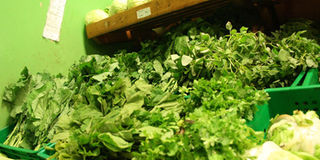Supermarkets pushing 'mama mbogas' out of greens business

PHOTO | FILE Vegetables on display at a Nakumatt supermarket in Nairobi.
What you need to know:
Increased purchasing power means customers want to buy everything at one place
For the past few years, business has not been good for Pauline Njeri, the owner of a small fruit and vegetable stall in Kasarani, Nairobi.
Her once-thriving venture is now a shadow of its former self.
“In 2011, I had about seven employees working for me, and the returns at the end of the month were very encouraging. Right now, I can only comfortably afford four workers. Profits have been at a plateau for some time now," she said.
Her fortunes changed when of Naivas and Nakumatt opened supermarkets in Kasarani.
“Competition is tough,” she said. “There is a Naivas store just a stone throw from here, while Thika Road Mall, about 30 minutes away, has a Nakumatt supermarket. Loyal customers who used to place orders for traditional vegetables like mchicha, terere, kunde, mrenda and managu now get their supply from the supermarkets.”
Like Ms Njeri, Ms Grace Jeptoo, who runs a vegetable stall in South C, is struggling to come to terms with her reduced profits. Her seven-year-old business that has been providing additional income for her family is fighting a tough battle against several larger retail outlets in the area.
“Most people nowadays prefer to do shopping for perishable consumables at the same time they shop for their other household items. My fruits are the only products that are being picked off the shelves as fast as they did before,” said Ms Jeptoo.
While the death of corner shops on the arrival of supermarkets has become the norm, the death of food kiosks and mama mbogas is also growing as retail chains pushing for more sources of revenue diversify into catering in foods and beverages.
And as the giant retail chains take over residential estates that were once the preserve of vegetable kiosks in a bid to get closer to the customers the mama mboga are being squeezed out of business.
Supermarkets stock an array of vegetables and fruits, snacks and cooked, frozen foods that require just a few minutes in the microwave. A visit to any major supermarket reveals counters in food sections filled with hot meals ranging from local to foreign delicacies.
These have become an instant hit with ever-busy Kenyans who are looking to spend less time in the kitchen after a hard day’s work.
“I cannot recall the last time I bought anything from a mama mboga, and I am sure many more Kenyans are guilty of that, too. In fact, the youth nowadays do not know how to cook. They barely own a sufuria in their homes,” said shopper Brisco Mwachumba.
Nakumatt managing director Atul Shah acknowledges the growing consumer demand for ready-to-eat meals, and the mega store is looking into additional ways to satisfy its customers.
But he disagrees that large supermarket chains are driving down sales for small estate kiosks. Formal retail stores, he emphasises, still trail informal fresh-produce outlets.
“Informal kiosks still provide retail needs to over 72 per cent of the populace,” he said. “There are more kiosks than there ever will be giant retailers.”
SHIFT IN TASTE
But Mr Shah concedes that as the number of people earning more money increases, tastes are shifting in favour of formal retail stores, indicating a change in lifestyle as well as urbanisation and normal aspirational dynamics.
“As long as the greater chunk of the population resides in slums, the growth of the formal retails will have minimal impact on mama mbogas,” said Geoffrey Injeni, director of the School of Finance and Applied Economics at Strathmore University, noting that for convenience purposes, mama mboga will always remain part of the distribution chain.
“At the end of the day, the main factor of consideration for most consumers is convenience. Location is an issue for most shoppers who would rather get their groceries from the mama mbogas outside their homes instead of going to supermarkets,” he said.
“The extent of growth for supermarkets can only be supported by the availability of space. So, unless somebody comes up with a new estate that has adequate housing facilities, there can only be so many formal stores.”




